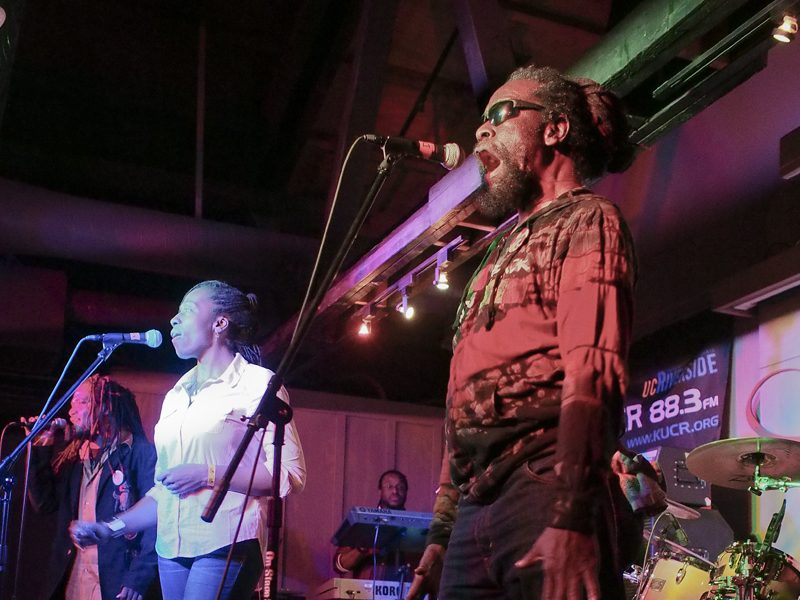
Local reggae fans flooded the Barn last Wednesday night in anticipation of viewing the iconic headliner, Black Uhuru, embrace their musical talents. Black Uhuru and their opening act, Indubious, performed not only to showcase their performance capabilities, but to also help bring people together. I arrived at the Barn to see the stage littered with drum sets, microphone stands and keyboards illuminated by colorful lights. It was amazing how people of all ages were lured into the Barn for the show, ranging from toddlers sitting on their parents’ shoulders to an elderly man with a cane.
Before any of the acts came on stage, the Barn played the classic and popular reggae songs that any fan would know, such as Bob Marley’s “One Love,” to help set the atmosphere for the opening act. Even before the performances began, audience members swayed to the music and seemed to be enjoying their time there. When the opening act, Indubious, took the stage, the audience huddled around to listen and absorb their feel-good vibes. The youthful trio hails from Oregon and has been on tour with Black Uhuru to shadow their expert performances. Their instruments — consisting of drums, a guitar, keyboard and a synthesizer — created a mixture of both reggae and dub, producing a steady, rhythmic and swaying beat.
As the first act came to an end, the audience craved more, chanting for an encore and insisting Indubious play just one more song. Never have I seen an audience chant “Encore!” for a band that was not the headliner, but the audience came together as one and began to chant and beg for more. The members of Indubious looked surprised and appreciative of all the love the audience was giving them, and hopped back on stage to play one last song.
During a quick intermission, more and more people began to flow into the Barn as we waited for Black Uhuru to come on stage. The venue was filled with plenty of people to begin with, and only continued to get more crowded. For a cold weekday night, there was surprisingly an enormous turnout — which makes sense, because Black Uhuru is certainly not new to the music industry. In fact, the group originated in Kingston, Jamaica in 1972 and reached a peak in their career during 1985, when their album “Anthem” won the first Grammy for “Best Reggae Album.” Since the start of their career, Black Uhuru have definitely gained some dedicated followers and have continued over these many years to share their love for reggae music.
As Black Uhuru took the stage, the scenery changed. Instead of only three people being on stage like I assumed, the trio had a band behind them playing the drums, guitar and keyboard while they took charge of vocals and harmonizing. People began to take their phones out and recorded songs, while others just danced and let the music flow through their bodies. The audience started out swaying back and forth and bobbing their head to the steady pulse of the banging drums. As people got more comfortable, audience members who were once strangers became friends and began to dance with one another. Before I knew it, the whole place was jamming out. The diversity in the room was astounding. People from all walks of life seemed to be at the venue, and the spiritual upliftment that reggae music brings allowed these people to come together and listen to the bands perform.
Even watching from afar, I could feel the heart and soul that these musicians put into their music for the sake of their audience. They began to play a few of their more popular songs like “Sistren” and “Sinsemilla,” in which many of the lyrics talk about truth and rights, acting as inspiration for the audience to keep moving. The crowd continued to bob their heads to the rhythmic accents of the keyboard, and the free spirit in everyone came alive as we witnessed people letting go and having fun.
One of the members of Indubious enlightened the audience with some life advice by saying, “Feel the vibrations to your soul through the music.” And this is exactly what the audience did. “Uhuru,” the Swahili word for freedom, became extremely relevant that night as people were free to let the music move their souls. Overall, the good vibes stemming from the artists and their music created something special throughout the audience of about 50 smiling, head-bobbing, reggae music fans: a sense of closeness.








